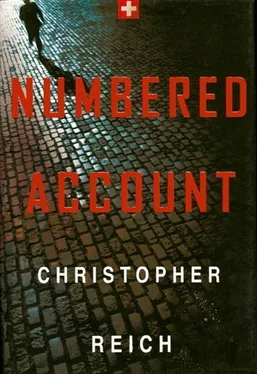Nick stood motionless in the dank shed. The words echoed in his ears and for a second longer he swore he was staring into those cold blue eyes. He blinked, and the apparition, if it had been one, faded.
Once, that memory had been an important component of his daily life. For a year after his father’s death, he had replayed it endlessly, hour after hour, day after day, trying to assign some deeper meaning to the words. Tortured by his futile curiosity, he had arrived at the conclusion that his father had been asking for his help, and that somehow he had failed him and was thus himself responsible for his murder. Sometime in his teens, the memory had faded and he had forgotten it. But he never quite absolved himself of his role in his father’s death.
A decade had passed since that memory had taunted him. His father had been right to worry. He could hardly remember him.
Nick stayed in the shed for a while longer. He had given up the idea of learning more about his father. To have the opportunity from Alex Neumann’s own hand was almost too much to believe. An unexpected gift. But his joy proved short-lived. A receipt acknowledging acceptance of his father’s possessions signed by a “Mrs. V. Neumann” was tucked inside the front cover of one of the leather-bound books. His mother had known about the agendas. She had purposely hidden them from her only son.
Nick spent the return flight to New York examining the agendas. He read both from cover to cover, first perusing the daily entries, then, alarmed, slowing to read each page carefully. He found mentions of a slippery client who had threatened his father and with whom, despite this, he had been pressed to do business; a shadowy local company that had merited the attentions of the Zurich head office; and most interesting, one month before his father’s death, a note providing the phone number and address of the Los Angeles field office of the Federal Bureau of Investigation. Taken singly, the entries constituted only small worries. Taken together, they demanded explanation. But when set against the backdrop of his father’s unsolved murder and his own guilty memories, they ignited a fire of doubt whose flames cast ill-defined shadows on the inner workings of the United Swiss Bank and its clients.
Nick returned to work the next day. His training schedule called for classroom instruction from eight to twelve. An hour into the first lecture—some dry cant about the underpricing of initial public offerings—his attention began to waver. He cast his eye around the auditorium, sizing up his fellow trainees. Like him, they were graduates of America’s leading business schools. Like him, they were pressed and coiffed and packaged into tailored designer suits and polished leather shoes. All managed to convey a slight insouciance in their postures while writing down every single word the speaker uttered. They regarded themselves as the chosen ones, and in fact, they were. Financial centurions for the new millennium.
Why then did he hate them so?
The afternoon saw his return to the trading floor. He took up his position at the elbow of Jennings Maitland, resident bond guru and avowed nail chewer. “Sit yer ass down, shut yer toilet, and listen up” was Maitland’s daily greeting. Nick did as he was told and for the next four hours immersed himself in the floor’s activity. He paid close attention as Maitland spoke with his clients. He kept dutiful track of the trader’s open positions. He even celebrated his boss’s sale of ten million bonds to the New York Housing Authority with an airborne high five. But inside him, his guts roiled and he wanted to throw up.
Five days before, Nick would have flushed with pride at Maitland’s big score as if his own presence were responsible in some minor, inconstruable way for the sale. Today he viewed the commerce with a jaundiced eye, wishing to distance himself not only from his boss’s dumping of ten million bonds (’fuckin’ dogs,” to quote Maitland, “real bowwows”) but from the entire trading operation.
He stood as if to stretch and peered around him. Row upon row of computer monitors stacked three high ran what looked like the length of a football field in every direction. A week ago he had gloried at the sight, thinking it a modern battlefield. He had relished his opportunity to join the fray. Today it looked like a technological minefield, and he wanted to stay the hell away from it. Lord pity the robots who passed their lives glued to bank upon bank of microwave-spewing cathode-ray tubes.
During the long walk home, Nick told himself his disillusion was temporary and come tomorrow he would regain his appetite for work. But five minutes after setting foot inside his apartment, he found himself pasted to his desk scrabbling through his father’s agendas, and he knew he’d been lying to himself. The world, or at least his view of it, had changed.
Nick went back to work the next day, and the day after that. He managed to keep up an eager facade, to pay attention in class and to laugh when required, but inside him a new plan was taking shape. He would resign from the firm, he would fly to Switzerland, and he would take the job Wolfgang Kaiser had offered him.
Friday night, he broke the news to his fiancee. Anna Fontaine was a senior at Harvard, a dark-haired Brahmin from the crustiest section of Boston with an irreverent wit and the kindest eyes he’d ever seen. He’d met her a month after beginning his studies. And a month after that they were joined at the hip. Before moving to Manhattan, he asked her to marry him and she’d said yes, without hesitation. “Yes, Nicholas, I want to be your wife.”
Anna listened without speaking as he laid out his argument. He explained that he had to go to Switzerland to find out what his father had been involved in when he was killed. He didn’t know how long he would be away—a month, a year, maybe longer—he only knew that he had to give his father’s life an ending. He handed her the agendas to read, and when she had finished, he asked her to go with him.
She said no. Without hesitation. And then she told him why he, too, could not go. First off, there was his job. It was what he’d been slaving for his entire life. No one passed up a slot at Morgan Stanley. One in seventy. Those were the odds of nabbing a slot as an executive trainee at Morgan Stanley, and that was after you’d made it through college and business school. “You did it, Nick,” Anna said, and even now, he could hear the pride in her voice.
But all he had to do was look at the agendas to know he hadn’t done anything at all.
What about her family? she asked, her delicate fingers interlaced with his. Her father had taken to Nick like a second son. Her mother couldn’t go a day without asking how he was and cooing about his latest successes. They would be crushed. “You are a part of us, Nick. You can’t leave.”
But Nick could not become part of another family until the mystery of his own was solved.
“And what about you and me?” she asked him finally, and he could see how much she hated to resort to her own attachment to convince him to stay. She reminded him of all the things they’d said to each other: that they were in it for the long haul; that they were the ones who really loved each other; friends forever, lovers who would die in each other’s arms. Together they’d take Manhattan. And he’d believed her. Hell, he’d believed all of it because it was true. As true as anything he’d ever known.
But that was before his mother died. Before he found the agendas.
In the end, Anna couldn’t understand. Or she just refused to. She broke off their engagement a week later, and he had not spoken to her since.
A sharp wind blew, mussing Nick’s hair and bringing tears to his eyes. He had given up his job. Shit, he’d even returned his seven-thousand-dollar signing bonus. He had cut off his fiancee, the one woman he’d ever really loved. He had turned his back on his entire world to track down a phantom lying hidden almost twenty years. For what?
Читать дальше












